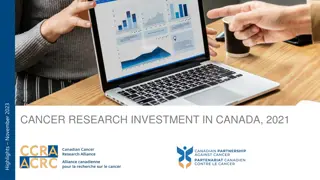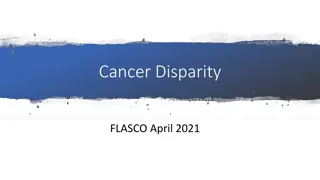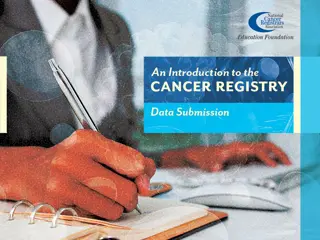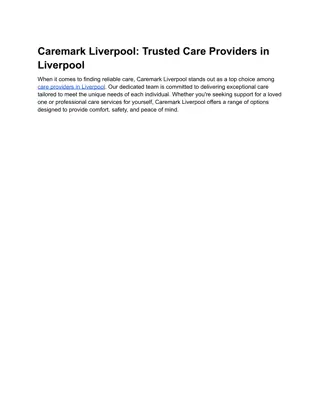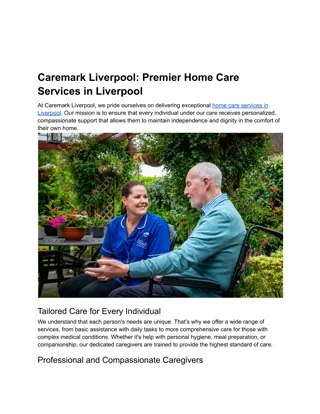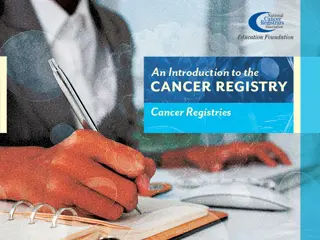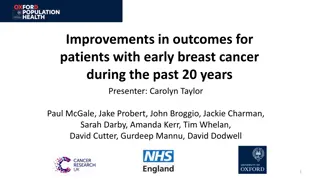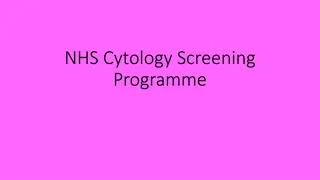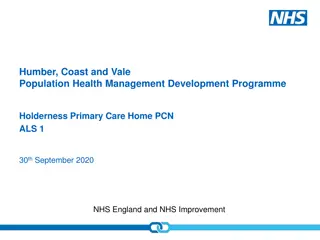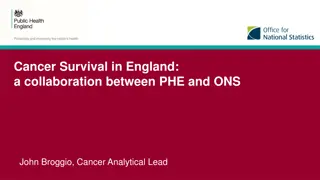Liverpool Health Partners Cancer Programme: Enhancing Cancer Outcomes Through Collaborative Research
Liverpool Health Partners (LHP) Cancer Programme led by Prof. Andrew Pettitt and Dr. Matina Tsalavouta aims to reduce cancer incidence and mortality, improve patient quality of life, and align with the One Liverpool strategy. The comprehensive strategy focuses on inclusive consultation, engagement, collaborative research, and building sustainable research capacity to drive positive cancer outcomes in Liverpool over the next five years.
Download Presentation

Please find below an Image/Link to download the presentation.
The content on the website is provided AS IS for your information and personal use only. It may not be sold, licensed, or shared on other websites without obtaining consent from the author.If you encounter any issues during the download, it is possible that the publisher has removed the file from their server.
You are allowed to download the files provided on this website for personal or commercial use, subject to the condition that they are used lawfully. All files are the property of their respective owners.
The content on the website is provided AS IS for your information and personal use only. It may not be sold, licensed, or shared on other websites without obtaining consent from the author.
E N D
Presentation Transcript
COLLABORATE | DISCOVER | IMPROVE Cancer Programme Prof. Andrew Pettitt Dr. Matina Tsalavouta matina.tsalavouta@liverpool.ac.uk 07469417539
Cancer in Liverpool: the population need Common cancers incidence and mortality in 2017 Cheshire and Merseyside 2,500 Compared to England average: 2,000 Higher cancer incidence Higher cancer mortality (but ) 1,500 Incidence Higher cancer survival Mortality 1,000 Lower participation in national screening programmes 500 Higher exposure to cancer risk factors 0 Lung Breast Prostate Colorectal Blood Gynae Pancreas H&NC Major health inequalities Data for all cancers except H&N have been extracted from https://www.cancerdata.nhs.uk/ *H&N data have been collected locally via MDT/s 15,259 people were diagnosed with cancer in C&M in 2017 6,834 people died of cancer in C&M in 2017 All tumours in Liverpool; cancer.data.nhs.uk (accessed 5/9/2019) https://www.cancerresearchuk.org/sites/default/files/local-cancer- stats/liverpool_wavertree_20180921.pdf
Within the next 5 years, LHP will have contributed to: liverpoolhealthpartners.org.uk Reduction in cancer incidence Reduction in cancer mortality Improvement in the quality of life of cancer patients Outcome focussed Alignment with One Liverpool strategy Research as a health improvement tool
LHP Cancer Programme: developing an inclusive strategy The Consultation process The Consultation outcomes Framework development High level of engagement Discovery Phase Endorsement of overall aim Analysis and priority setting Extensive collaborative network Launch and Implementation A strategy
Building a single and improved narrative for cancer research in Liverpool The LHP Cancer Programme Strategy (2019-2024) The overarching aim of the LHP Cancer programme strategy is: to improve cancer outcomes by advancing high-quality collaborative research and embedding it in cancer services across the region . Collectively we will: 1. Build a collaborative cancer research community across the LHP research ecosystem that covers the entire patient pathway including prevention, screening, awareness, rapid diagnosis, treatment, living with and beyond cancer and end-of-life care. 2. Attract inward investment and high-calibre researchers to the region by creating translational research epicentres focussing on strategic themes and initiatives. 3. Increase clinical trial activity in all tumour types by identifying, encouraging and nurturing leadership and teamwork across partner organisations. 4. Build sustainable research capacity for all cancer-related specialities across the region by embedding research in the clinical service.
The LHP Cancer Programme Strategy Objective 1. Build a collaborative cancer research community across the LHP research ecosystem that covers the entire patient pathway including prevention, screening, awareness, rapid diagnosis, treatment, living with and beyond cancer and end-of-life care. LHP Cancer Research Theme Proposed lead partner organisation Prevention Liverpool City Council & CCG Earlier diagnosis (screening, awareness, rapid diagnosis) CCG & LJMU Clinical effectiveness and patient experience (discovery science, experimental medicine, clinical evaluation) UoL & CCC (Liverpool Cancer Research Institute) Living with and beyond cancer LJMU End-of-life care Edge Hill & CCG Delivery of objective: Programme Themes will be based on the patient pathway in alignment with NHS long-term plan Each Programme Theme will be co-ordinated by a working group led by a relevant partner organisation The WG leads will be members of the Cancer Programme Leadership Team
The LHP Cancer Programme Strategy Objective 2. Attract inward investment and high-calibre researchers to the region by creating research epicentres focussing on strategic themes and initiatives. Health Inequalities & Cancer LHP Cancer Research Theme Proposed lead partner organisation Psycho-social oncology (Walton/Alder Hey) Prevention Liverpool City Council & CCG Cardio-oncology Neuro-oncology Lung Cancer (LUHFT/CCC) (LHCH/CCC) (CCC/LHCH) (CDC/ARC) Earlier diagnosis (screening, awareness, rapid diagnosis) CCG & LJMU Liverpool Cancer Research Institute Clinical effectiveness and patient experience (discovery science, experimental medicine, clinical evaluation) Liverpool Cancer Research Institute (UoL & CCC) (UoL & CCC) Living with and beyond cancer LJMU End-of-life care Edge Hill & CCG Delivery of objective: Liverpool Cancer Research Institute (led by UoL and CCC) Cardio-oncology workstream with LHP Cardiovascular Disease Programme (led by LHCH) Neuro-oncology workstream with LHP Neuroscience Programme (led by Walton and Alder Hey) Psychosocial oncology workstream (led by CCC and LUFHT) Health Inequalities & Cancer workstream (CDC, ARC) Workstreams for specific cancers reflecting regional strategic priorities (e.g. lung cancer)
Liverpool Cancer Research Institute: Translational research engine for patient benefit Clinical service Clinical theme x Clinical theme 1 Clinical theme 2 Clinical theme 3 Clinical trials Forward translation Reverse translation Potential CR-UK Centre Science theme x Funding streams to drive cross-disciplinary collaboration in key areas Liverpool Cancer Research Institute
The LHP Cancer Programme Strategy Objective 3. Increase clinical trial activity in all tumour types by identifying, encouraging and nurturing leadership and teamwork across partner organisations. Delivery of objective: Working with key agencies outside of LHP to influence strategic priorities in the region, e.g. - NIHR CRN North West Coast - Cheshire & Merseyside Cancer Alliance Working with LHP Partner Organisations to develop the research capability and infrastructure required to deliver these priorities - Clinical trial leadership - Clinical trial delivery
The LHP Cancer Programme Strategy Objective 4. Build sustainable research capacity for all cancer-related specialities across the region by embedding research in the clinical service. Planned delivery of this objective: Collaborative education programme focusing initially on cancer (pilot) and potentially expanding to other LHP programmes Joint development of course content by Surgical Oncology (Countess of Chester lead) and non-surgical Oncology (CCC lead) Will complement existing educational programmes of partner organisations
LHP Cancer Programme Strategy: Measuring progress and success The premise: Facilitatory function of LHP contributes to better cancer outcomes whilst each partner organisation delivers to its own strategy Need dual process to measure progress and success? System-level targets for cancer outcomes agreed by partner organisations - e.g. One Liverpool target to reduce early cancer mortality by 25% by 2025 Specific contribution of LHP via facilitation e.g. - New collaborations that leverage external funding or generate research outputs - Building a single and improved narrative for cancer research in the region
Cancer/COVID-19: developing research Portfolio development - Adding cancer dimension to COVID-19 studies - Adding COVID-19 dimension to cancer studies - New stand-alone Cancer/COVID-19 studies - Optimise recruitment of cancer patients into all COVID-19 studies >10 Cancer related studies approved by STOP COVID New cross-organisational collaborations and external funding awards - CCP-Cancer UK - 340K NIHR/UKRI funding - SAFE-Surgery - multiple new collaborations (including LWH) and national funding - UK Coronavirus Cancer Monitoring Project
LHP Cancer Programme Strategy: Next steps and risk management Next steps and priorities: 1) Recruitment of Cancer Programme manager 2) Establishing and operationalising the leadership group 3) Continuing with the operational delivery in all areas How can the Cancer programme best support you to deliver on your evolving organisational strategies?




